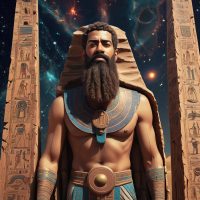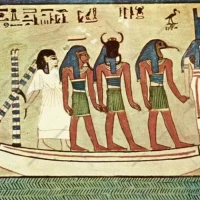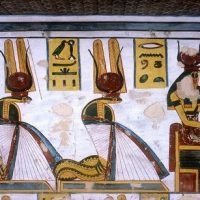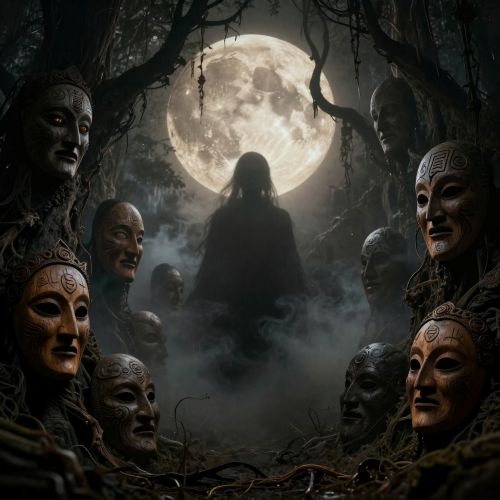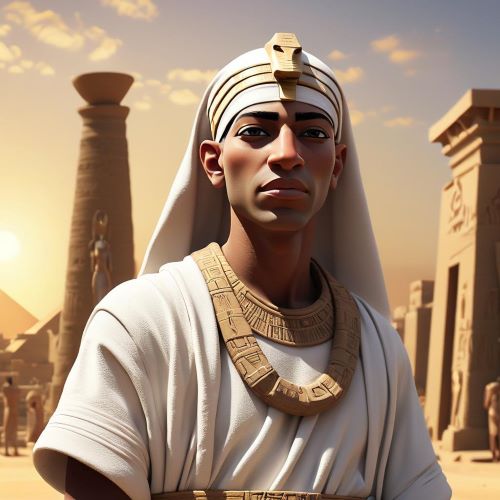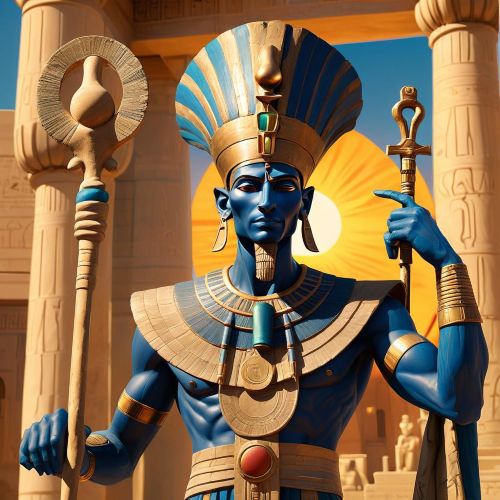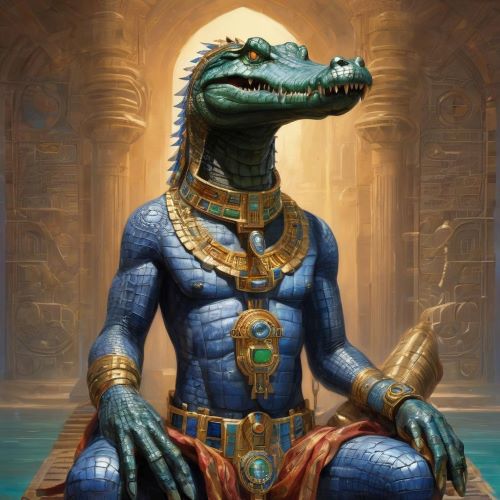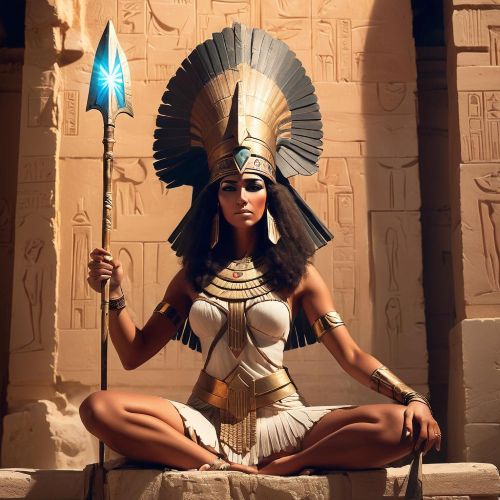Hu : God of Creative Word
Listen
At a glance
| Description | |
|---|---|
| Origin | Egyptian Mythology |
| Classification | Gods |
| Family Members | N/A |
| Region | Egypt |
| Associated With | Spoken Word, Creativity |
Hu
Introduction
In the intricate belief system of ancient Egypt, Hu (ḥw) symbolized one of the most profound concepts in their cosmology—the divine power of speech. He represented the creative utterance, the very word that initiated the act of creation. According to Egyptian theology, it was through speech that gods shaped the world, making Hu not simply a deity, but the embodiment of the creative force of language itself. Emerging from the earliest texts such as the Pyramid Texts of the Old Kingdom, Hu’s essence was tied to the first word spoken by Atum, the self-created god, at the dawn of existence. In this vision, speech was not a mere form of communication—it was the vibration that summoned the cosmos into order. Hu thus personified divine articulation, the bridge between thought and creation, linking mind, word, and the living world in eternal harmony.
Physical Traits
Unlike the anthropomorphic or zoomorphic gods of the Egyptian pantheon, Hu’s appearance was largely symbolic, reflecting his abstract nature. He was occasionally shown as a bearded man, or as a figure bearing the hieroglyph for “tongue,” emphasizing his dominion over speech. In some depictions, Hu took the form of a falcon or a man with a ram’s head, both symbols of power, divine authority, and creative vitality. The falcon connected him with celestial vision and the sun’s journey across the heavens, while the ram symbolized generative energy. Because Hu represented an invisible principle rather than a tangible being, his presence in art was rare, appearing mostly in funerary scenes and solar imagery. One symbolic identification even equated him with the Great Sphinx of Giza, whose lion’s body and human face embodied both the commanding voice of kingship and the watchful power of divine speech.
Family
Hu’s mythological associations tie him to other deities embodying abstract aspects of creation. He was most closely connected to Sia, the personification of perception and intellect. Together, they formed a divine dyad representing thought and word—the essential elements of creation. In the theology of Ptah, the Memphite creator god, Sia was identified as the “heart” (the source of thought), and Hu as the “tongue” (the power of speech), illustrating the process through which divine ideas were transformed into reality. This concept reflects a profound philosophical understanding of creation as an intellectual and linguistic act.
In some myths, both Hu and Sia were considered emanations of Atum or Ra, born from the creator’s first utterance or from his blood, linking them to the primal forces that shaped existence. Later, during the New Kingdom, Hu joined other abstract deities such as Heka (magic) and Irer (vision) within the divine court of Amun-Ra, representing the cosmic functions of will, speech, and perception that maintained the universe’s balance.
Other names
Hu’s name, written in hieroglyphs as ḥw, literally means “utterance” or “command.” This term encapsulated his divine role as the spoken manifestation of creation. Occasionally rendered as “Huu” or “Hw,” the name emphasizes his connection to the breath of life, a concept closely tied to both speech and existence. Over time, particularly during the Ptolemaic period, Hu’s identity merged with that of Shu, the god of air, highlighting how “breath” and “word” were intertwined as creative forces. In later philosophical thought, Hu’s concept found parallels in the Greek notion of Logos, the divine word or reason that orders the cosmos. This continuity illustrates how the Egyptian understanding of Hu’s power resonated across cultures and influenced broader traditions of metaphysical thought.
Powers and Abilities
Hu’s dominion was the authority of the spoken word—the power to transform thought into being. His creative utterance was believed to have brought the world into existence when Atum first spoke his name at the beginning of time. This act of divine speech established the cosmic order, or ma’at, and set the precedent for all subsequent acts of creation. The Egyptians understood words as inherently magical; to speak was to shape reality. Thus, Hu embodied the force behind all speech, the vibration that made divine will manifest.
In the Memphite Theology, Hu and Sia represented Ptah’s tongue and heart, showing that the god’s thoughts and words were the tools of creation. Every temple ritual and priestly recitation was an echo of Hu’s first utterance, reenacting creation through sacred language. Hu’s power extended into the afterlife, where he accompanied the deceased pharaoh as a divine companion. In the Pyramid Texts, Hu’s presence ensured that the king retained the authority to command even in the spiritual realm. His words preserved order among the gods, affirming that speech—when divinely inspired—was eternal and indestructible.
Hu was also said to serve aboard Ra’s solar bark, navigating the sun god through the underworld’s perilous journey each night. In this role, Hu’s voice guided the sun’s rebirth at dawn, symbolizing the renewal of life through sound. His speech was not only creative but protective, preserving divine order against chaos and silence.
Modern Day Influence
Although Hu is less recognized today compared to other Egyptian deities, his conceptual legacy has endured across religious, philosophical, and spiritual traditions. The sacred connection between sound, speech, and creation—central to Hu’s identity—appears in diverse forms around the world. In Sufism, the sacred syllable “Hu” (meaning “He” or “God”) is used as a divine name, chanted in remembrance and meditation. Similarly, the Hindu and Buddhist mantra “Om” carries a parallel meaning as the primordial sound from which the universe emerged. These cross-cultural echoes demonstrate how deeply the Egyptian concept of creative utterance influenced later mystical traditions.
In the modern spiritual movement Eckankar, “Hu” is revered as the sound behind all sounds, a chant used to attune oneself with divine love and spiritual awareness. Its practitioners view it as a way to connect with the essence of life, mirroring the ancient Egyptian understanding of Hu as the sound that brings existence into being.
Scholars and philosophers continue to draw upon Hu’s symbolism to explore the metaphysics of language—how words shape human consciousness and societal structures. In contemporary art, literature, and digital mythology, Hu has been reimagined as a symbol of sonic creation, a cosmic coder whose voice programs reality. Within modern Kemetic (Egyptian revivalist) spirituality, Hu’s principle is invoked to emphasize the power of spoken intention and ritual speech in shaping both personal and cosmic order.
Ultimately, Hu’s enduring significance lies not in temples or statues, but in the idea that sound itself is divine—that every word, when spoken with truth and purpose, carries the same creative force that once gave birth to the stars. His presence reminds us that speech is sacred, thought is powerful, and creation begins with a single utterance.
Related Images
Source
Cairo Top Tours. (2023, January 21). HU God of Spoken Word. Retrieved from https://www.cairotoptours.com/Egypt-Travel-Guide/Gods-of-Ancient-Egypt/hu-god-of-spoken-word
World History Encyclopedia. (2016, April 13). Egyptian Gods – The Complete List. Retrieved from https://www.worldhistory.org/article/885/egyptian-gods—the-complete-list/
Wikipedia. (2004, September 29). Hu (mythology). Retrieved from https://en.wikipedia.org/wiki/Hu_(mythology)[7]
Journey to Egypt. (2024, September 30). Gods of Egypt, Egyptian Gods and Goddesses. Retrieved from https://www.journeytoegypt.com/en/blog/gods-of-egypt
Wilkinson, R. H. (2003). The Complete Gods and Goddesses of Ancient Egypt. Thames & Hudson.
Assmann, J. (2001). The Search for God in Ancient Egypt. Cornell University Press.
Pinch, G. (2002). Handbook of Egyptian Mythology. ABC-CLIO.
Hornung, E. (1996). Conceptions of God in Ancient Egypt: The One and the Many. Cornell University Press.
Frequently Asked Questions
What is lorem Ipsum?
I am text block. Click edit button to change this text. Lorem ipsum dolor sit amet, consectetur adipiscing elit. Ut elit tellus, luctus nec ullamcorper mattis, pulvinar dapibus leo.
What is lorem Ipsum?
I am text block. Click edit button to change this text. Lorem ipsum dolor sit amet, consectetur adipiscing elit. Ut elit tellus, luctus nec ullamcorper mattis, pulvinar dapibus leo.
What is lorem Ipsum?
I am text block. Click edit button to change this text. Lorem ipsum dolor sit amet, consectetur adipiscing elit. Ut elit tellus, luctus nec ullamcorper mattis, pulvinar dapibus leo.
What is lorem Ipsum?
I am text block. Click edit button to change this text. Lorem ipsum dolor sit amet, consectetur adipiscing elit. Ut elit tellus, luctus nec ullamcorper mattis, pulvinar dapibus leo.
What is lorem Ipsum?
I am text block. Click edit button to change this text. Lorem ipsum dolor sit amet, consectetur adipiscing elit. Ut elit tellus, luctus nec ullamcorper mattis, pulvinar dapibus leo.


